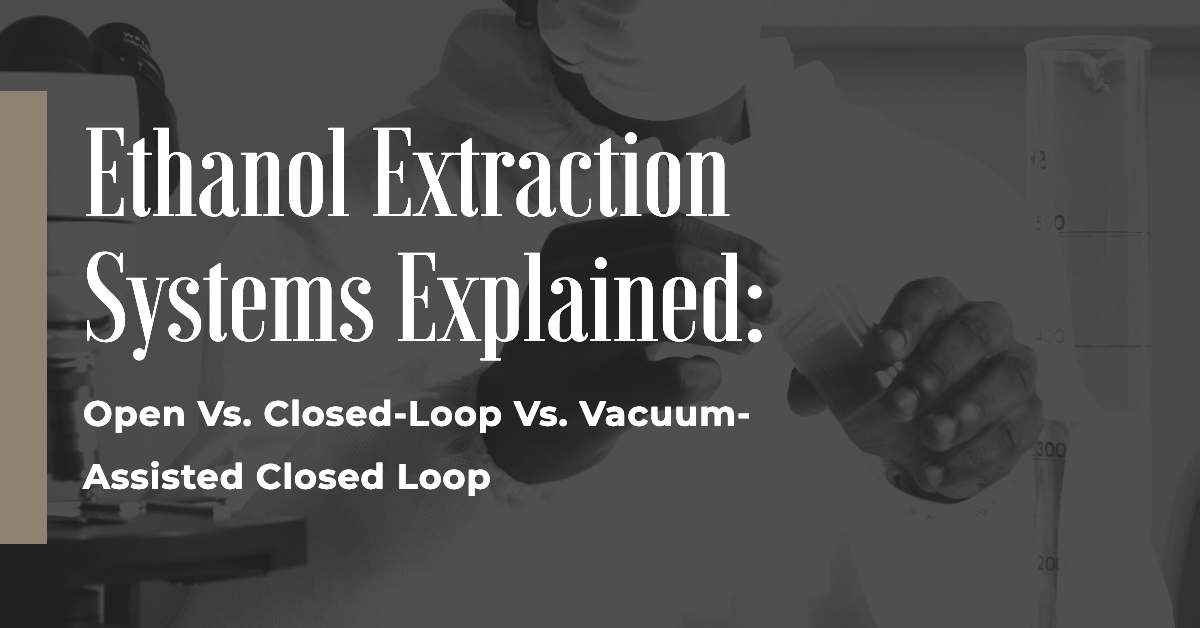
When it comes to extracting from cannabis,
Ethanol Extraction Systems become a logical choice for those who want consistent results and a larger quantity of material. While more complicated than
rosin extraction, ethanol extracts take away risks such as burning your material or the need to exert an enormous amount of pressure.
If you’re considering going for the ethanol route in making extracts, there are some things you need to know about before proceeding. First of all, there are three kinds of Ethanol extraction systems: Open-loop, Closed-loop, and Vacuum-assisted Closed-loop. Each system has its pros and cons, which we will elaborate on below.
Open-loop Systems
Open-loop
systems for ethanol extraction of cannabis are the most straightforward approach in getting extracts. The plant material to be used is placed in an open-ended tube, wherein butane is poured onto your material and leave it soaked for extraction. This process takes days and doesn’t yield the best results since you need to let the Ethanol evaporate naturally. It’s possible to speed things up by heating the soaked cannabis, but that comes with the risk of possible explosions due to the Ethanol and open flame. Heating, likewise, also burns any flavor or aromatics.
On top of that concern, while the solvent evaporates, it can’t be helped, but there would still be traces of Ethanol or other solvents in the final product. While often in small amounts, these levels are not safe for medical purposes, although small tolerable quantities are still okay for culinary or recreational use.
Open-loop systems also have the advantage of doing large quantities, provided you have a massive vat to hold the cannabis and Ethanol. You can say this system is moderately efficient with the more significant amounts it can handle but uses more Ethanol.
Closed-loop Systems
Closed-loop systems are much safer than the Open-loop system as it eliminates potential gas leaks by enclosing solvents within the extraction system. These devices need to pass safety standards set by the government before they are sold to consumers. But in exchange, your oil is free from any form of solvent, which makes them safer to use for medical-grade ingredients.
A Closed-loop system has three essential parts: a solvent tank to hold the Ethanol, a container for plant materials, and a collection base to put the concentrates.
A Closed-loop system moves the Ethanol from the solvent tank to another container to wash the plant material to extract the concentrates. This process is repeated and dissolves cannabinoids and terpenes. The concentrates are cleaned and separated by putting the collection tank in warm water and the solvent tank in dry ice or ice water. Ethanol then evaporates from the collection tank and passes through a tube back to the cold solvent tank, which then reforms to a liquid state.
While safer to use, Closed-loop systems are costlier than Open-loop systems. Safety comes with a price, but it’s money well-spent since these systems pass safety standards set.
Vacuum-assisted Closed-loop Systems
Vacuum-assisted Closed-loop systems don’t differ too much from Closed-loop systems, in a sense that they maintain the same safety standards in the typical system. But what sets them apart from the Closed-loop system is the vacuum system it employs. Aside from having a vacuum that allows you to reuse your Ethanol, these systems also use a vacuum to contain everything in one container without any leaks.
Unlike the Closed-loop system, where some solvent is lost, the Vacuum-assisted keeps everything within the system. Vacuum-assisted systems also have smaller capacities compared to closed-loop and open-loop systems. An excellent example of this would be
Extract Craft Source Turbo Extractor.
Concentrate Extraction Without Ethanol
Another way of extracting from cannabis is through a Rosin Press. While many dubbed the Rosin Press as a better option than Ethanol Extractors, the Rosin Press still has weak points.
First, a Rosin press does not produce consistent results. While you do get a range of possible yields, Ethanol extraction has a much better consistency rate.
A Rosin Press is also limited to the amount of pressure exerted on it. Although there are electric rosin presses in the market, most of these extractors still need brute force to get the most out of the material. On top of that, there’s also that risk of burning, especially when you overdo the pressure.
Rosin presses also have a smaller capacity than ethanol extraction. But even with these flaws, given the purity of the extracts and the ease of use, a Rosin press remains a formidable choice for extraction. Meanwhile, Ethanol extracts still win for their consistent results.
Which One Should You Get?
These extraction systems have different strengths and weaknesses that one should look at before implementing Ethanol or solvent-based extraction system. At the end of the day, what you should get should be based on your end goal: do you want something affordable and accessible, or are you willing to get complicated with your system? That said, there are plenty of options available in the market for solvent-based extraction systems, and there will be one that’s best for you.



